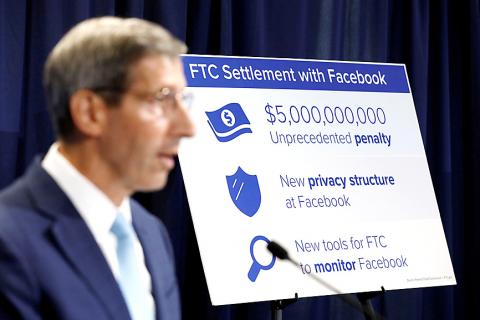Facebook Inc on Wednesday reported that its quarterly profit plummeted due to the cost of a US privacy settlement and forecast that regulation would slow its moneymaking ad machine.
Profit in the second quarter fell 49 percent from a year ago to US$2.6 billion, while revenue increased 28 percent to US$16.9 billion.
The lower profits were due in part to Facebook setting aside an extra US$2 billion to cover a massive settlement with US regulators on privacy and data protection.

Photo: Reuters
The US$5 billion settlement announced by the US Federal Trade Commission calls for revamped federal oversight of the social network’s privacy policies.
Facebook would also be required to conduct a privacy review of every new or modified product, service or practice before it is implemented, including for its Instagram and WhatsApp services.
In the earnings report, the leading online social network beat market expectations on revenue and user growth, and shares rose slightly in after-hours trading that followed the release of the earnings figures.
“We had a strong quarter and our business and community continue to grow,” CEO Mark Zuckerberg said.
The number of people using Facebook monthly grew 8 percent to 2.41 billion in the quarter that ended on June 30.
The number of monthly users topped 2.7 billion when taking into account Instagram, WhatsApp and Messenger, along with the main social network, according to Facebook.
During an earnings call, Facebook executives said that regulation and efforts inside the company to ramp up privacy would be “headwinds” to ad targeting, which powers the company’s revenue.
Compounding the effect of controls such as the General Data Protection Regulation in Europe, and increased focus on privacy in operating systems and products are “creating headwinds that we think are going to impact us as we get later in the year and into 2020,” chief financial officer David Wehner said.
Privacy and compliance efforts also require significant investment in process, people and infrastructure, he added.
Zuckerberg renewed his call for legislators around the world to set clear, uniform standards on important issues such balancing free speech with fighting online bullying or election meddling.
He also reaffirmed his commitment to the social network’s quest to launch Libra cryptocurrency, despite pushback from governments and critics.
Facebook last month unveiled plans for Libra in an announcement that sparked fears of the unintended consequences of a loosely supervised global currency.
The Swiss Financial Market Supervisory Authority has already pledged to conduct oversight of the Geneva-based Libra Association that is to watch over the digital money, which is expected to debut next year.
“Facebook from a few years ago would have probably just showed up and tried to release a product on our own,” Zuckerberg said of Libra during a call with analysts.
The California-based company’s approach regarding sensitive territory is now to outline ideas and allow “a period of however long it takes” to get feedback and figure out the best path forward, he said.
“That’s certainly what we’re planning to do with Libra,” Zuckerberg said. “We are trying to provide a safe and stable and well-regulated product; that’s always been the strategy and we’ll continue to engage here.”

DIVIDED VIEWS: Although the Fed agreed on holding rates steady, some officials see no rate cuts for this year, while 10 policymakers foresee two or more cuts There are a lot of unknowns about the outlook for the economy and interest rates, but US Federal Reserve Chair Jerome Powell signaled at least one thing seems certain: Higher prices are coming. Fed policymakers voted unanimously to hold interest rates steady at a range of 4.25 percent to 4.50 percent for a fourth straight meeting on Wednesday, as they await clarity on whether tariffs would leave a one-time or more lasting mark on inflation. Powell said it is still unclear how much of the bill would fall on the shoulders of consumers, but he expects to learn more about tariffs

NOT JUSTIFIED: The bank’s governor said there would only be a rate cut if inflation falls below 1.5% and economic conditions deteriorate, which have not been detected The central bank yesterday kept its key interest rates unchanged for a fifth consecutive quarter, aligning with market expectations, while slightly lowering its inflation outlook amid signs of cooling price pressures. The move came after the US Federal Reserve held rates steady overnight, despite pressure from US President Donald Trump to cut borrowing costs. Central bank board members unanimously voted to maintain the discount rate at 2 percent, the secured loan rate at 2.375 percent and the overnight lending rate at 4.25 percent. “We consider the policy decision appropriate, although it suggests tightening leaning after factoring in slackening inflation and stable GDP growth,”

Greek tourism student Katerina quit within a month of starting work at a five-star hotel in Halkidiki, one of the country’s top destinations, because she said conditions were so dire. Beyond the bad pay, the 22-year-old said that her working and living conditions were “miserable and unacceptable.” Millions holiday in Greece every year, but its vital tourism industry is finding it harder and harder to recruit Greeks to look after them. “I was asked to work in any department of the hotel where there was a need, from service to cleaning,” said Katerina, a tourism and marketing student, who would

i Gasoline and diesel prices at fuel stations are this week to rise NT$0.1 per liter, as tensions in the Middle East pushed crude oil prices higher last week, CPC Corp, Taiwan (台灣中油) and Formosa Petrochemical Corp (台塑石化) said yesterday. International crude oil prices last week rose for the third consecutive week due to an escalating conflict between Israel and Iran, as the market is concerned that the situation in the Middle East might affect crude oil supply, CPC and Formosa said in separate statements. Front-month Brent crude oil futures — the international oil benchmark — rose 3.75 percent to settle at US$77.01